#eliza knox hamilton
Text

No comment
#alexander hamilton jr#john church hamilton#james alexander hamilton#elizabeth hamilton#eliza p. knox#philip hamilton the second#yeah.#Angelica Hamilton#yep.
43 notes
·
View notes
Text
Working on some more Alex Jr and Eliza Knox 🩷

4 notes
·
View notes
Note
Do you know anything about Eliza P. Knox and her relationship with Alexander Hamilton Junior?
Love your blog, thank you for everything<3
After serving as Aide-de-camp to his late father's friend, General Morgan Lewis, until June of 1815, Alexander resumed law practice and “paid his addresses to” Eliza P. Knox. [x] Eliza was the daughter of Thomas (Records sometimes name him William) Knox and Mary Hester “Kortright” Knox. Mary was the sister of Elizabeth Monroe, James Monroe's wife. And Knox was at that time a leading merchant in New York City. Her birthdate and location of birth are both unknown, unsubstantial sources vary between her birth year being around 1796 or 1801.
In 1817, Alexander married Eliza. According to John Pintard, Eliza and Alexander eloped and ran away from the Knoxs' initially, before matters were resolved;
The father wd not consent & a runaway match ensued. A reconciliation took place a year after, when Prest Monroe visited this city, Mrs Knox, deceased, & Mrs M. being sisters.
Barck, Dorothy C., and Pintard, John. Letters from John Pintard to His Daughter, Eliza Noel Pintard Davidson, 1816-1833. United States, New-York Historical Society, 1940.
It is possible Alexander, perhaps with his wife, went and saw his uncle-in-law - James Monroe - on his deathbed. As he writes devastatingly to James Madison, [30 June 1831];
The newspapers having announced the dangerous indisposition of your much respected friend Col James Monroe, I have the melancoly task of informing you that his death is inevitable, and will most probably take place before this reaches you. Mr Monroe retains entire possession of his mental faculties and with perfect firmness and integrity awaits his demise.
“Alexander Hamilton[, Jr.] to James Madison, 30 June 1831,” Founders Online, National Archives, https://founders.archives.gov/documents/Madison/99-02-02-2379. [This is an Early Access document from The Papers of James Madison. It is not an authoritative final version.]
In 1833, Alexander bought from Thomas E. Davis a Federal style townhouse constructed two years prior for his mother and his family in New York City, located at 4 St. Mark's Place in the East Village section of Manhattan, for $15,500. At the same time, Davis purchased The Grange from Elizabeth - age 76 years old - for $25,000. For nine years, from 1833, to 1842, Alexander and his wife Eliza, lived there with his mother, his sister Eliza Hamilton Holly, and her husband Sidney Augustus Holly (Yes, that's three whole Elizas'). The house still survives to this day, and is known as the Hamilton-Holly house.
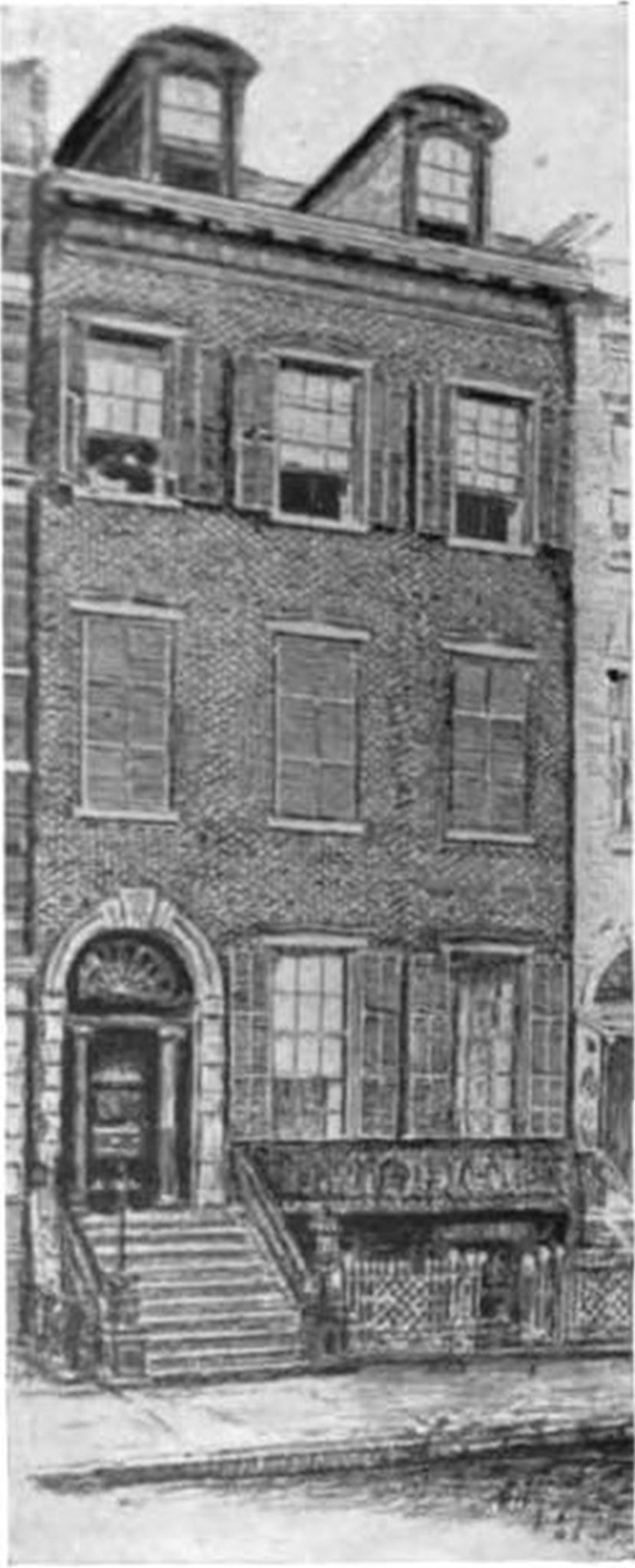
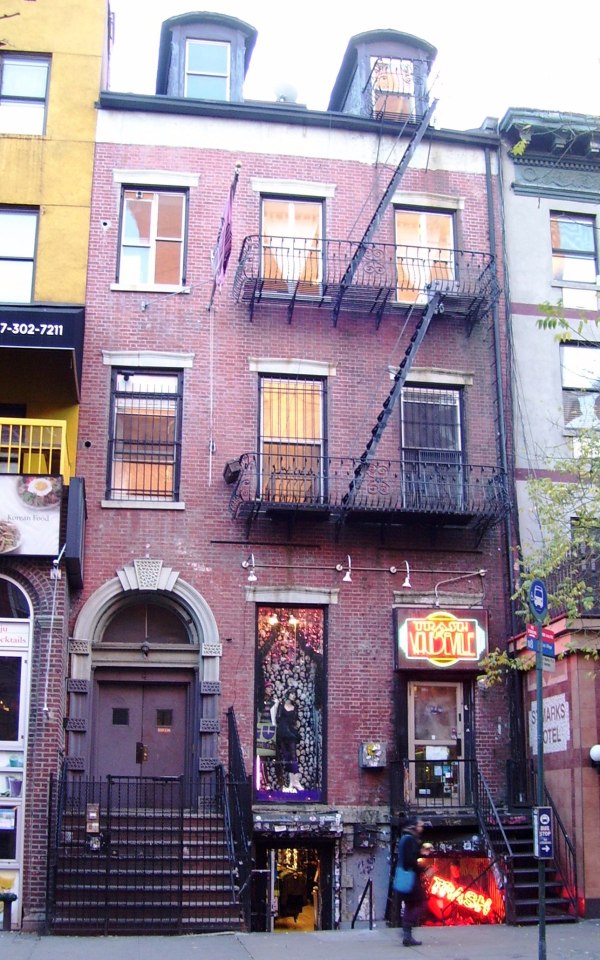
In 1835, Eliza and Alexander drove in a coach and four through the West travelling over four thousand miles. It was on this trip, in Illinois, where he met Abraham Lincoln in a grocery store. Lincoln was reportedly; “lying upon the counter in midday telling stories.” [x]
When Eliza Knox died July 21st of 1871, Alexander moved to New Brunswick, New Jersey. Before residing in New York City, where he lived his last few years before dying August 2nd, 1875, at his home, 83 Clinton Place, in Greenwich Village. The couple seemed to have been happily in love, and never had any children.
Hope this helps, and you're welcome!
#amrev#american history#19th century#alexander hamilton jr#eliza p knox#history#hamilchildren#hamilton children#hamilkids#hamilton kids#hamilton family#queries#cicero's history lessons#lolacatemary
39 notes
·
View notes
Text
Elizabeth S. Hamilton at the Constitutional Convention, June 1797
Elizabeth Schuyler attended a diplomatic meeting at the age of 6; as a teenager, she hosted politicians solo; her relationship with George Washington predates Alexander Hamilton's. As a married adult, she stood in for Martha Washington, she led the Republican Court in NYC, she led charitable endeavors, and she hosted any number of national and international figures, from bankers to politicians, etc. U.S. presidents through the 1840s paid homage to her. But as so many women of the early Republic were, she was pretty deliberately erased. Particularly excised were the contributions and political activism of the Federalist wives - the amount of influence these women had could not be discussed.
And so by the late 20th century, we have historians writing that ESH didn't like politics and was sickly, usually pregnant, and often absent from her husband, but at least she tried to make a nice cozy environment for the Great Alexander Hamilton to go home and snuggle in, or something like that, as though it didn't occur to these historians that Elizabeth Schuyler likely could have married any number of wealthy, accomplished (and distant relative) men and lived a very comfortable life of luxury in Albany. And yet she looked at the super-charismatic guy who everyone said was brilliant, but with no steady income, not even a lawyer yet and with no ties to Albany, but noted as highly ambitious and said, "yep, he's the one!" Spoiler: she did it because she was ambitious herself and recognized that theirs could be a strong strategic/political partnership, in addition to a strong marriage. (I'm sure it was also good for her ego that he declared himself her best friend after only a few weeks and was so far gone he couldn't remember a military password after an evening with her.)
This erasure led to the common assumption that Elizabeth was not in Philadelphia at the Constitutional Convention in summer 1787. However, statutesandstories.com has posted about new evidence - really, a more careful examination and reading of old documents - that ESH was in Philadelphia in June 1797, and was likely in the city at the time of AH's June 18th speech to the convention. The theory is that she traveled with the Knoxes from NYC to Philadelphia, as she's mentioned in a letter from Knox that she is traveling with them, and she's definitely with AH on June 19th, as they are recorded in a journal/diary at a social engagement also attended by George Washington. Additional conjecture that this letter from AH can be more tightly dated to this period, considering these lines:
I cannot yet determine what will be our stay here and consequently I can make no determinations about my love; but I feel that it will be impossible for me to submit to a long separation however inconvenient it may be to incur the expence which will attend her coming here.
Which may align with EH borrowing money for this travel from her brother-in-law, Stephen van Rensselaer, also possibly more tightly dated to this period.
Please check out the well-cited posts (3 parts): 1, 2, and 3
Although no Hamilton biographers have discussed Eliza’s trip to the Convention in June, historians from Independence National Historic Park (INHP) concluded in the 1980s that Eliza was one of as many as nine wives who likely “attended” the Convention. Part 4 (pending) will discuss Eliza Hamilton’s relationship with the other eight wives who likely were in Philadelphia during the Convention, including Rufus King’s wife, Mary Alsop King, who was a native New Yorker.
This makes total sense to me - not just the documentation presented, but that she would have shown up to perform soft politicking/diplomacy around her husband's activities, in addition to a possible role assisting him in the drafting and editing of his speech. The daughter of Philip Schuyler and Catharine Van Rensselaer wasn't going to sit in NYC on the sidelines for this - she bolstered Hamilton not only in the ways she was personally helpful to him (emotionally, but also going over his writings and speeches with him), but through her representation of the wealthy Dutch-American interests, showing that Hamilton was a junior delegate from NY with a lot of political and financial power backing him.
As the blog states:
Yet it remains possible that Eliza may have helped her husband prepare for his one-of-a-kind speech on June 18. Moreover, it is felt that the possibility of informal, behind-the-scenes contributions by Eliza cries out for further examination.
Cause ya know, she's not discussing new threads for her needlework and thoughts on child-weaning at all these social gatherings or standing in for Martha Washington and chatting with Martha's husband about the best ways to make pastry.
And I just love if she helped advise him on a speech that only the "rich and well-born" can make a strong government. I'm sure they felt quite haughty and proud and said, "let's make another baby!" (James Alexander Hamilton was born around 9 months later.)
16 notes
·
View notes
Note
[phases through your screen]
i want to pick your brain about hamilton and religion because like everything about this man it kept changing, but maybe that's just the human condition.
we know he met a dr knox but that was an entirely educational occupation. we know the storm absolutely shook him to the core but that's mortal to the core. i feel like as all men, as all people, the moment he needn't have to depend on the faith for a divine and merciful father he just let it push back. and it seems?? sort of?? that society itself was still holding onto the enlightenment era aye? which is funny because there also seems to be some sort of religious upheaval through different denominations (of protestantism) in America.
and then we have the constitution which didn't even bother thinking about Christianity in explicit terms. it seems to be a gotcha but back then i feel like it was more of an obviously it'll be this, how could it possibly change thing
benjamin franklin DID try to have a prayer to guide them towards a more harmonious and productive convention only to be rejected because they couldn't afford a chaplain. which, i didn't know protestantism had fun stuff like chaplains, we just have Brother (in Christ) and Sister (in Christ) and then if you're good and of binary genrder you graduate to Pastor (and ascend onwards to Chief Pastor, i believe) and Mother (and Senior Sister, and then ur seniority depends on the seniority of your faith home) ANYWAYS
again we know after philip's death he was a lot more religious, he at least read the sermons even if he didn't attend church regularly ish? and he begged to be buried in trinity church (i thought he would get into the dutch reformation church? after marrying eliza?) and yeah so that's just
this is just how a man would deal with religion i guess. but faith seems different. and its funny/sad how hamilton who never could depend on others never has much speaking about his faith either.
and i have to consider all this when he has someone he's close with like oc who's a faithful man. who's self-styled to be a sort of man of god, with divinely granted foreknowledge. primarily, i feel like hamilton would have been a lot tenser about getting entangled with laurens, if we assume that they had a steady, fairly sweet relationship
A lot of what I'm about to reply totally echoes what you've already stated, but I'm gonna yap anyway. tl;dr, hamilton's religion may have been comforting to him but I don't think they were rigid moral lessons that he practiced, even later in life, except as performance or to further comfort himself. sad, little faith in him as a person? maybe, idk. sorry
If I'm being so honest, I think Hamilton's religiousness later in life was due in part to environment + age (his wife and her family, the slowing of youthful ambition and perceived hubris associated with questioning social standards, religion, life as one tries to find themselves in their teens and 20s) but also performance. Maybe it's his upbringing, but I just don't see him as a religious man so much as a man surrounded by religion. (My reply to this submission has taken sooo long because I'm having trouble organizing my thoughts on it, which are certainly not objective, I'm not citing any sources here so take anything I write with a grain of salt, and my opinion on the characterization of Hamilton's later-life religion is definitely influenced by my own experience with Protestant Christianity in the U.S.).
Okay, so everyone's religious. Not everyone, but most everyone, even prominent men who subscribed to science and philosophy and would consider themselves a different sect of Christian, even if that veered into the territory of agnosticism. Colonials and the countries from which they came accepted at this time that there is a Creator and the big question during Hamilton's young life was whether the Creator had given kings and queens the right to rule over everyone else. Politics, always politics. So even if Hamilton was more agnostic as many youths are as they struggle to learn more about the world, their opinions, and to find their place within society, he's not going to go around being Godless. I think his religiousness later in his life was impacted by the fact that it was the philosophy most (colonizers) people subscribed to in some way or another, from England to France to Spain. (I'd like to add also that even if his mother ((or his mother's ex-husband Johann Lavien)) was potentially Jewish which is potentially the reason he'd have a Jewish tutor and know how to cite the Torah in Hebrew, any learning in Judaism, Hebrew, or the Torah does not necessitate him being Jewish because Christianity is rooted in Judaism. That's a whole other thing and I imagine learning about Judaism would make him a better-rounded individual and more knowledgeable in religion and it's interesting to portray him/take liberties with this information in fiction).
So Hamilton's getting older and more sure of his beliefs, performing also for his political agenda, and he is now a part of a Christian family with a reputation, so of course he's going to value religion in public. He has a moral responsibility to raise his children that way, to attend services himself. History, science, philosophy, politics, economics, literature, math, it was all taught through the lens of religion.
I also think there is a degree of tranquility and comfort he was finding in religion, in going to church like a meditation, in quiet, and in his final moments, hoping his life meant something, afraid to die and hoping everything he believed in his faith was true, that there isn't just nothing, that in a way, he'd live on. It's frightening to know for hours that you are going to die, to have a child who died just a few years prior, and to have that time to reflect on your life? No wonder he sought the comfort of religion. He was still a young guy, he had kids, his wife, I'm sure he wasn't nearly ready. But you know how he's characterized most often... a frightened and ambitious man running on a timer for his whole life, unsatisfied and feeling nothing was ever enough. Maybe that's another reason he sought religion. It might have felt peaceful and good.
As for his relationship with Laurens... this is conjecture until I shovel some true sources to back this statement, but I think he didn't care. I think, especially when he was young, he did feel that he had the impunity to love who he loved or have intimate physical relationships outside of marriage and that that couldn't be wrong. His teenage poetry (objection, your honor, my client was just a celibate horndog) and his reputation indicated he might have been having physical relations before ever marrying, which was improper but not as entirely inappropriate for a man as it was a woman (people didn't like this anyway). If his letters to Laurens were any indication, he didn't write anything that would give a negative connotation to their relationship, meanwhile he chided Laurens for apparently thinking a "cure" was necessary (say the word "cure" and the historical lams/amrev tumblrstorians go bonkers. that sentence was crazy. both exciting as a piece of evidence and... completely heart-breaking). I think John had a great deal of guilt and shame, I mean, he just seemed to be full of that at least starting in his late teens... probably around the time he realized the attraction to men vs. how completely unacceptable that was in most contexts. then his many mistakes in his early 20s before joining the war, i mean. poor guy.
Hamilton? I do NOT think he was like that at all. I think he could understand it, but he probably didn't feel it in the same capacity and for that reason. Hating yourself because you feel like you'll never be good enough? He and Laurens had that in common. Hating same-sex attraction, sex, and romance? No way. He seemed to know that part of himself well and besides marrying for the long list of reasons he had to do so, I don't think he would ever let religion get in the way of how deeply he felt and desired love. Love of God would bring him closer to Elizabeth and their children. Love of God would not negate his relationship with Laurens. Also to tack on, it was not for a lack of God or religion that he told Laurens that straight marriage ≠ cure. I would imagine that his relationships with men, emotional and physical and anything else, were separate from what he considered to be his marital duties.
#this is so messy#im sorry#alexander hamilton#answered asks#thanks as always jolesofthehowls ily#this is a shitty discussion bc im just rambling and not editing#but very fun idea to discuss and explore anyway#especially with fictional interpretations of Hamilton and his family#always love to hear from you <3
4 notes
·
View notes
Note
Hamilton won’t abandon ship,
Yo, let’s steal their cannons—
MULLIGAN
Shh-boom!
COMPANY
Boom!
WASHINGTON
Goes the cannon, watch the blood and the shit spray and…
COMPANY
Boom!
WASHINGTON
Goes the cannon, we’re abandonin’ Kips Bay and…
COMPANY
Boom!
WASHINGTON
There’s another ship and…
COMPANY
Boom!
WASHINGTON
We just lost the southern tip and…
COMPANY
Boom!
WASHINGTON
We gotta run to Harlem quick, we can’t afford another slip.
Guns and horses giddyup,
I decide to divvy up
my forces, they’re skittish as the British cut the city up.
This close to giving up, facing mad scrutiny,
I scream in the face of this mass mutiny:
are these the men with which I am to defend America?
We ride at midnight, Manhattan in the distance.
I cannot be everywhere at once, people.
I’m in dire need of assistance…
BURR
Your excellency, sir!
29
WASHINGTON
Who are you?
BURR
Aaron Burr, Sir?
Permission to state my case?
WASHINGTON
As you were.
BURR
Sir,
I was a captain under General Montgomery
until he caught a bullet in the neck in Quebec,
and well, in summary
I think that I could be of some assistance.
I admire how you keep firing on the British
from a distance.
WASHINGTON
Huh.
BURR
I have some questions, a couple of suggestions
on how to fight instead of fleeing west.
WASHINGTON
Yes?
BURR
Well—
HAMILTON
Your excellency, you wanted to see me?
WASHINGTON
Hamilton, come in, have you met Burr?
HAMILTON
Yes, sir.
HAMILTON AND BURR
We keep meeting.
30
BURR
As I was saying, sir, I look forward to seeing
your strategy play out.
WASHINGTON
Burr?
BURR
Sir?
WASHINGTON
Close the door on your way out.
HAMILTON
Have I done something wrong, sir?
WASHINGTON
On the contrary.
I called you here because our odds are beyond scary.
Your reputation precedes you, but I have to laugh.
HAMILTON
Sir?
WASHINGTON
Hamilton, how come no one can get you on their staff?
HAMILTON
Sir!
WASHINGTON
Don’t get me wrong, you’re a young man, of great renown.
I know you stole British cannons when we were still downtown.
Nathaniel Green and Henry Knox wanted to hire you…
HAMILTON
To be their Secretary? I don’t think so.
WASHINGTON
Why’re you upset?
HAMILTON
I’m not—
31
WASHINGTON
It’s alright, you want to fight, you’ve got a hunger.
I was just like you when I was younger.
Head full of fantasies of dyin’ like a martyr?
HAMILTON
Yes.
WASHINGTON
Dying is easy, young man. Living is harder.
HAMILTON
Why are you telling me this?
WASHINGTON
I’m being honest.
I’m working with a third of what our Congress
has promised.
We are a powder keg about to explode,
I need someone like you to lighten the load. So?
COMPANY (EXCEPT HAMILTON)
I am not throwin’ away my shot!
I am not throwin’ away my shot!
Ayo, I’m just like my country, I’m young,
scrappy and hungry!
HAMILTON
I am not throwing away my shot!
WASHINGTON
Son,
WASHINGON AND COMPANY
We are outgunned, outmanned!
HAMILTON
You need all the help you can get.
I have some friends. Laurens, Mulligan,
Marquis de Lafayette, okay, what else?
WASHINGTON AND COMPANY
Outnumbered, outplanned!
32
HAMILTON
We’ll need some spies on the inside,
Some King’s men who might let some things slide.
HAMILTON
I’ll write to Congress and tell ‘em
we need supplies, you rally the
guys, master the element of
surprise.
I’ll rise above my station, organize
your information, ‘til we rise to the
occasion of our new nation. Sir!
ENSEMBLE
Here comes the General!
HAMILTON
Rise up!
HAMILTON
Rise up!
ENSEMBLE
Here comes the General!
HAMILTON
Rise up!
COMPANY
Boom!
Chicka-boom!
ENSEMBLE
Here comes the General!
SCHUYLER SISTERS
Rise up!
SCHUYLER SISTERS AND
WOMEN
Rise up!
ELIZA/ANGELICA/PEGGY
Whoa, whoa, whoa…
Whoa, whoa, whoa…
ELIZA/ANGELICA/PEGGY
AND WOMEN
Whoa, whoa, whoa…
LAURENS/LAFAYETTE/
MULLIGAN
What?
LAURENS/LAFAYETTE/
MULLIGAN
What?
LAURENS/LAFAYETTE/
MULLIGAN
What?
FULL COMPANY
Here comes the General!
HAMILTON
What?
WASHINGTON
And his right hand man!
FULL COMPANY
Boom!
why so many booms. why the violence.
2 notes
·
View notes
Text

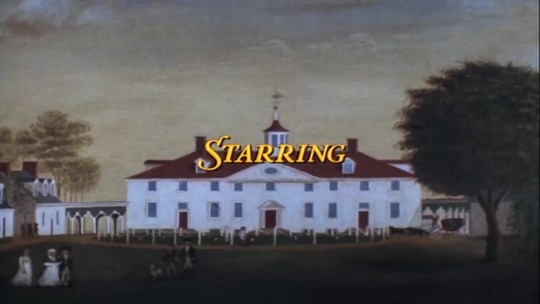

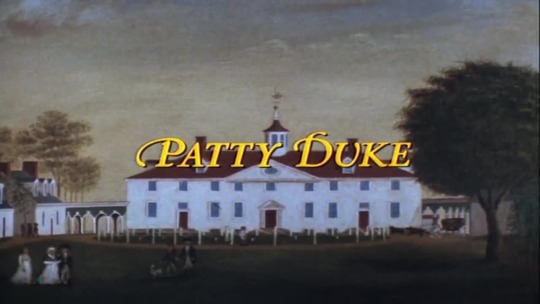
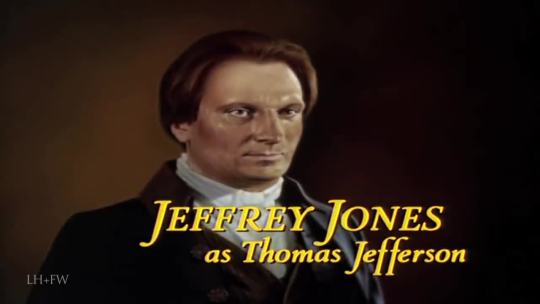


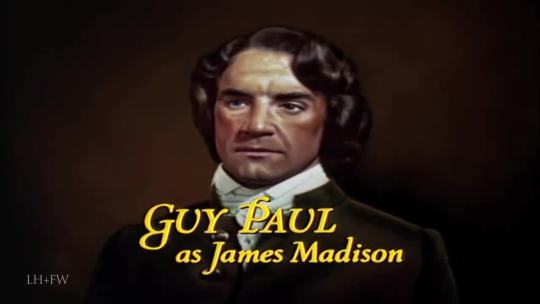
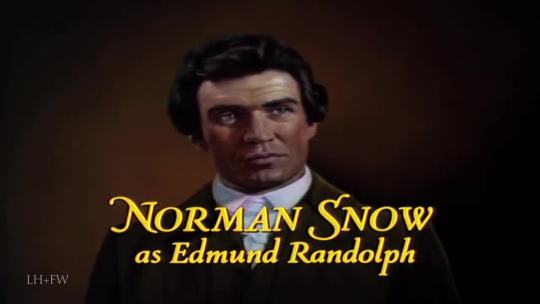
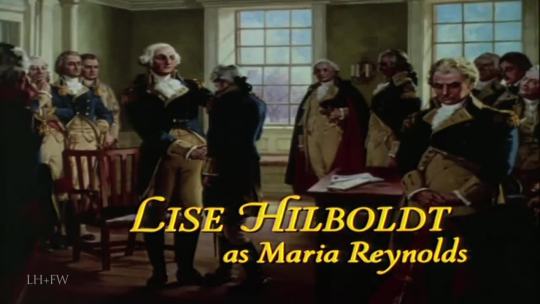
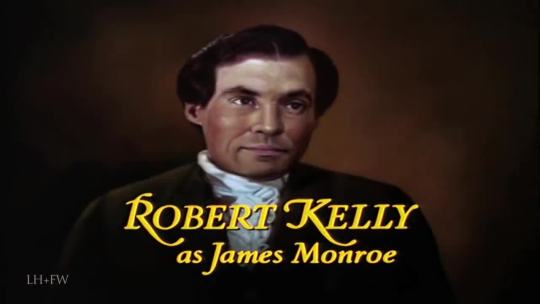




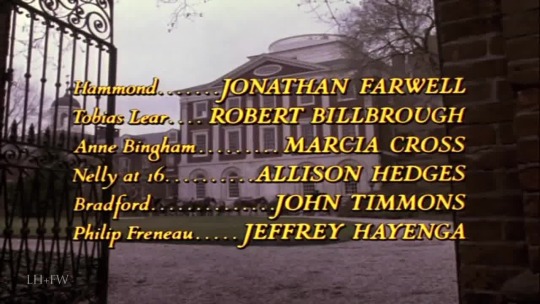
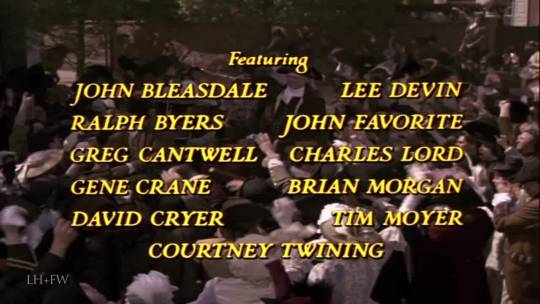

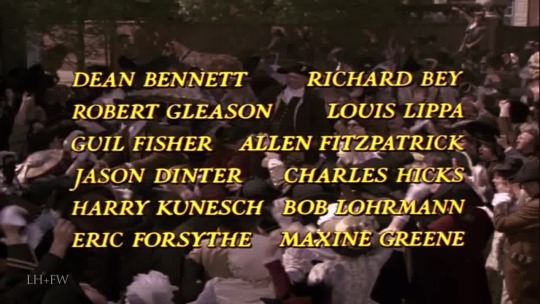

George Washington II: The Forging of a Nation - CBS - September 21-22, 1986
Historical Drama (2 episodes)
Running Time: 190 minutes
Stars:
Barry Bostwick as George Washington – Commander-in-Chief of the Continental Army, and later first President of the United States
Patty Duke Astin as Martha Washington – Wife of George Washington
Jeffrey Jones as Thomas Jefferson
Richard Bekins as Alexander Hamilton
Penny Fuller as Eliza Powel
Eve Gordon as Elizabeth Schuyler Hamilton
Marcia Cross as Anne Bingham
Guy Paul as James Madison
Norman Snow as Edmund Randolph
Robert Kelly as James Monroe
Lise Hilboldt as Maria Reynolds
Haviland Morris as Henrietta Liston
Daniel Davis as Patrick Henry
Richard Fancy as William Duer
Farnham Scott as Henry Knox
Nicholas Kepros as John Jay
#George Washington II: The Forging of a Nation#TV#1986#Historical Drama#CBS#Barry Bostwick#Patty Duke#Jeffrey Jones#Daniel Davis#Richard Bekins#Penny Fuller#Guy Paul#Robert Kelly
9 notes
·
View notes
Note
part 4? i think? i kinda lost count
Hamilton won’t abandon ship,
Yo, let’s steal their cannons—
MULLIGAN
Shh-boom!
COMPANY
Boom!
WASHINGTON
Goes the cannon, watch the blood and the shit spray and…
COMPANY
Boom!
WASHINGTON
Goes the cannon, we’re abandonin’ Kips Bay and…
COMPANY
Boom!
WASHINGTON
There’s another ship and…
COMPANY
Boom!
WASHINGTON
We just lost the southern tip and…
COMPANY
Boom!
WASHINGTON
We gotta run to Harlem quick, we can’t afford another slip.
Guns and horses giddyup,
I decide to divvy up
my forces, they’re skittish as the British cut the city up.
This close to giving up, facing mad scrutiny,
I scream in the face of this mass mutiny:
are these the men with which I am to defend America?
We ride at midnight, Manhattan in the distance.
I cannot be everywhere at once, people.
I’m in dire need of assistance…
BURR
Your excellency, sir!
29
WASHINGTON
Who are you?
BURR
Aaron Burr, Sir?
Permission to state my case?
WASHINGTON
As you were.
BURR
Sir,
I was a captain under General Montgomery
until he caught a bullet in the neck in Quebec,
and well, in summary
I think that I could be of some assistance.
I admire how you keep firing on the British
from a distance.
WASHINGTON
Huh.
BURR
I have some questions, a couple of suggestions
on how to fight instead of fleeing west.
WASHINGTON
Yes?
BURR
Well—
HAMILTON
Your excellency, you wanted to see me?
WASHINGTON
Hamilton, come in, have you met Burr?
HAMILTON
Yes, sir.
HAMILTON AND BURR
We keep meeting.
30
BURR
As I was saying, sir, I look forward to seeing
your strategy play out.
WASHINGTON
Burr?
BURR
Sir?
WASHINGTON
Close the door on your way out.
HAMILTON
Have I done something wrong, sir?
WASHINGTON
On the contrary.
I called you here because our odds are beyond scary.
Your reputation precedes you, but I have to laugh.
HAMILTON
Sir?
WASHINGTON
Hamilton, how come no one can get you on their staff?
HAMILTON
Sir!
WASHINGTON
Don’t get me wrong, you’re a young man, of great renown.
I know you stole British cannons when we were still downtown.
Nathaniel Green and Henry Knox wanted to hire you…
HAMILTON
To be their Secretary? I don’t think so.
WASHINGTON
Why’re you upset?
HAMILTON
I’m not—
31
WASHINGTON
It’s alright, you want to fight, you’ve got a hunger.
I was just like you when I was younger.
Head full of fantasies of dyin’ like a martyr?
HAMILTON
Yes.
WASHINGTON
Dying is easy, young man. Living is harder.
HAMILTON
Why are you telling me this?
WASHINGTON
I’m being honest.
I’m working with a third of what our Congress
has promised.
We are a powder keg about to explode,
I need someone like you to lighten the load. So?
COMPANY (EXCEPT HAMILTON)
I am not throwin’ away my shot!
I am not throwin’ away my shot!
Ayo, I’m just like my country, I’m young,
scrappy and hungry!
HAMILTON
I am not throwing away my shot!
WASHINGTON
Son,
WASHINGON AND COMPANY
We are outgunned, outmanned!
HAMILTON
You need all the help you can get.
I have some friends. Laurens, Mulligan,
Marquis de Lafayette, okay, what else?
WASHINGTON AND COMPANY
Outnumbered, outplanned!
32
HAMILTON
We’ll need some spies on the inside,
Some King’s men who might let some things slide.
HAMILTON
I’ll write to Congress and tell ‘em
we need supplies, you rally the
guys, master the element of
surprise.
I’ll rise above my station, organize
your information, ‘til we rise to the
occasion of our new nation. Sir!
ENSEMBLE
Here comes the General!
HAMILTON
Rise up!
HAMILTON
Rise up!
ENSEMBLE
Here comes the General!
HAMILTON
Rise up!
COMPANY
Boom!
Chicka-boom!
ENSEMBLE
Here comes the General!
SCHUYLER SISTERS
Rise up!
SCHUYLER SISTERS AND
WOMEN
Rise up!
ELIZA/ANGELICA/PEGGY
Whoa, whoa, whoa…
Whoa, whoa, whoa…
ELIZA/ANGELICA/PEGGY
AND WOMEN
Whoa, whoa, whoa…
LAURENS/LAFAYETTE/
MULLIGAN
What?
LAURENS/LAFAYETTE/
MULLIGAN
What?
LAURENS/LAFAYETTE/
MULLIGAN
What?
FULL COMPANY
Here comes the General!
HAMILTON
What?
WASHINGTON
And his right hand man!
FULL COMPANY
Boom!
my work here is done. enjoy!!!
Ronda of applause for you :)
Good job I thoroughly enjoyed this :3
1 note
·
View note
Text
So I asked my Instagram followers who they thought was the most attractive Hamilton son (my design, not historical)....
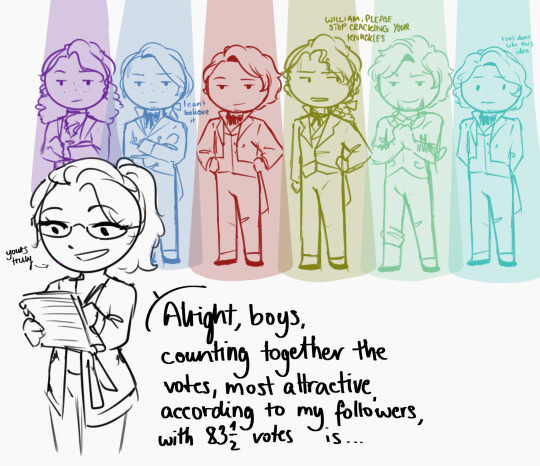




Does this belong on tumblr?? No idea but have it idk
#philip hamilton#alexander hamilton jr#james alexander hamilton#john church hamilton#william stephen hamilton#philip hamilton ii#mary morris hamilton#maria eliza van den heuvel hamilton#eliza knox hamilton#rebecca mclane hamilton
118 notes
·
View notes
Text
TIL that...
Alexander Hamilton Jr., the 3rd son of Alexander Hamilton married an Eliza namely Eliza Knox. Alexander Hamilton Jr. (1816–1889), the 3rd son of James Alexander Hamilton who is the 4th son of Alexander Hamilton married an Angelica namely Angelica Livingston.
https://www.reddit.com/r/hamiltonmusical/comments/hl20wm/til_that/
#hamilton#alexander hamilton#alexander hamilton jr#james alexander hamilton#eliza knox#eliza schuyler#eliza hamilton#angelica livingston#angelica schuyler#hamgelica#hamliza
25 notes
·
View notes
Note
I hope you don’t mind if I ask, do you think Hamilton could have had some kind of ptsd?
Fascinating question! I hesitate to ascribe any particular mental health diagnosis to historical figures, because it’s really hard to tell what’s going on with them internally based on scraps from letters and descriptions. That said, Hamilton certainly suffered through some major traumas during his life. His manner of coping with those traumas is a really interesting topic to explore.
His childhood was rife with trauma, from the death of his mother to his cousin’s suicide to being left to fend for himself at a very young age. Though he did keep in touch with some friends and family back in the Caribbean after he left to some extent, his manner of dealing with the horror of his early life seems to have been largely by burying it deep and cutting himself off from that time in his life. Hugh Knox, Hamilton’s friend and mentor, bemoaned the loss of contact with Hamilton in his letter dated 27 October 1783:
My old & good friend. Faith between you and me, it hath puzzled me very much to account for your long Silence. Three years have now Elapsed since my last from you, tho’ I have wrote you frequently in that time. Can any thing have happened on my part, which Should have So long deprived me of the pleasure of hearing from you? When you were Covered with the dust of the Camp, & had cannon balls whistling thick about your ears, you used to Steal an hour’s Converse with an old friend every 5 or 6 months; & now, in a time of profound peace & tranquillity, you cannot, it Seems, find two minutes for this kind office. I think I know you too Well, to Suppose you could take offence at any free Strictures on the times which might have dropped from my pen in the Confidence of friendship, when you know how firmly & enthusiastically I was attached to the Cause in which you were Embark’d. Or, Since your Marr⟨iage to t⟩he amiable Miss Schyler, are you So loss’d in ⟨– – –⟩ as to render you forgetful of your other friends? ⟨Or⟩ are you grown too rich & proud, to have a good Memory? Or are you so Engaged in Writing the History of the American War (Cujus Maxima pars facisti, & which you know I have appointed you to) that you have no time to write letters? Or— or— or— pray what is it? Pray make Haste to Explain this Strange Mystery!
Hamilton does appear to have confided in Eliza some of the more painful parts of his past. When he received news in 1782 that his half brother Peter Levine had died, he wrote to Eliza simply, “You know the circumstances that abate my distress, yet my heart acknowledges the rights of a brother.” A lingering anger and a reticence to revisit that painful period in his life can be inferred from the brief note. John Church Hamilton also said that his father rarely spoke of his childhood. When Hamilton broke that silence, it was to speak of happier times to do with his mother or his schooling:
His mother died during his childhood, a woman of superior intellect, elevated sentiment, and unusual grace of person and manner. To her he was indebted for his genius….[R]arely as he alluded to his personal history, he mentioned with a smile, his having been taught to repeat the decalogue in Hebrew, at the school of a Jewess, when so small that he was placed standing at her side upon a table. ( “Life of Alexander Hamilton” v.1 pg. 42).
The war also seems to have left it’s mark upon Hamilton. During the war, Hamilton often showed himself not only resigned, but eager to die in battle. In a letter to John Laurens date 8 January 1780, he confided:
In short Laurens I am disgusted with every thing in this world but yourself and very few more honest fellows and I have no other wish than as soon as possible to make a brilliant exit. ’Tis a weakness; but I feel I am not fit for this terrestreal Country.
When Hamilton came home after the battle of Yorktown in 1781, he fell sick and spent almost two months in and out of bed. (On 29 December 1781, he wrote to his friend Nicholas Fish, “I have been very sick—I am still alternately in and out of bed.”) Hamilton had a history of falling dangerous ill after periods of intense strain, but I wonder if that illness may have had a mental component. Later in his life, he confided in Eliza about an “impertinent gloom” hanging over his mind, which has the strong flavor of depression. Perhaps the trauma of battle made it hard for him to get out of bed as much as any physical illness.
In a letter to Vicomte de Noailles from November or December 1781 regarding Lord Cornwallis, he expresses holding on to rage and anger towards both the commander and the British, which may have been a way to cope with having killed in battle a month or two previously. He confessed to de Noailles:
Your knowledge of our nation induces you to think, that after a victory, in the tranquil moment of reflection, we can judge with calmness, and even protect the person whom the preceeding hour we had attacked with eagerness; though for myself I disclaim the loss of animosity, certain that a constant and eternal hatred is the only method to humble our enemy—like Rome who inflexible in her enmity, even after the destruction of Carthage, could not forgive her former glory.
The thought of taking a human life clearly weighed upon him until his death. On 10 July 1804, the night before the duel with Burr, Hamilton wrote Eliza an explanation for his decision to throw away his fire:
The Scruples of a Christian have determined me to expose my own life to any extent rather than subject my self to the guilt of taking the life of another. This must increase my hazards & redoubles my pangs for you. But you had rather I should die innocent than live guilty.
Losing Philip was another major trauma in Hamilton’s life. I’ve written in more detail about Hamilton’s reaction to Philip’s death, but briefly, he seems to have dealt with the worst of it by burying it down deep, much like the terrible memories of his childhood. In a letter to John Dickinson dated 29 March 1802, he explained:
I was not, My Dear Sir, insensible to the kind attention shewn me by your letter of the 30th. of November last. But till very lately the subject has been so extremely painful to me, that I have been under a necessity of flying from it as much as possible. Time and effort and occupation have at length restored the tranquillity of my mind, sufficiently to permit me to acknowlege the kindness of those friends who were good enough to manifest their sympathy in my misfortune.
As a means of distracting himself in the white hot intensity of his grief just after Philip’s death, Hamilton began an essay series entitled “The Examination” that ran in the New York Post from December 1801 to March 1802. These essays have been largely ignored by historians, as the editors on Founders explain in the introductory note to the series:
“The Examination” was by almost any standard of measurement inferior to most of Hamilton’s earlier polemical essays. Many of his points are petty or inconsequential; his reasoning is at times more superficial than profound; and his repetitiveness and verbosity stand in marked contrast to his usual incisiveness.
57 notes
·
View notes
Text

I think I lost three lives doing this
25 notes
·
View notes
Text

Alex Jr. and his girl, Elizabeth Knox 🩷🩷🩷
3 notes
·
View notes
Text
Mrs. Elizabeth Schuyler Hamilton, the daughter of General Philip J. Schuyler, and widow of Alexander Hamilton, 1st., took him [Reverend Alexander Hamilton] then a little boy in his seventh year to St. Paul's Chapel. New York, and said to him: “If anyone ever tells you that George Washington was not a communicant of the Church, you say that your great grandmother told you to say that she ‘had knelt at this chancel rail at his side and received with him the Holy Communion.’”
Source — Mrs. Alexander Hamilton, Witness That George Washington Was a Communicant of the Church
This book was an interesting quick read! Apparently many were questioning George Washington's “lack of orthodoxy”, and it talks a lot about the later generation of the Hamiltons' and their accounts in regards to the inquiries. It mainly revolves around Reverend Alexander Hamilton's accounts, who was the son of John Church Hamilton. But it includes interesting tidbits about the family, like a trip JCH and his family took to Washington D.C. in the spring of 1854. They were likely visiting Eliza because she was already living there with her daughter, Holly, since 1848;
IT WAS A BEAUTIFUL MORNING IN MAY, 1854, that the family coach drew up in front of the family home, 17 w. 20th. Street, New York City. There Mrs. General Hamilton (who had come on from Washington, D. C., with her son), her daughter-in-law, Mrs. John Church Hamilton, and A. Hamilton (the writer of this letter and present Rev. Alexander Hamilton) entered and rode to Wall Street, corner of Broad, New York City.
THEN MRS. GENERAL HAMILTON, her daughter-in-law and great-grandson, Alexander, entered the former house of Alexander Hamilton. Going to the front window, Mrs. Hamilton said, “I, with Mrs. Knox and other ladies, looked from this window over to Federal Hall and saw George Washington inaugurated first President of the United States. Then we all walked up Broadway to St. Paul's Chapel, Fulton Street.
Washington, Chancellor Livingston, General Knox and your great-grandfather (meaning General Hamilton), went into the chapel and occupied the pew on the north side. We ladies sat just back of them, but Mrs. Washington was not present, being yet at Mount Vernon. A festal celebration was held, sermon preached by the rector, and the Holy Communion was also celebrated, at which Washington, members of his party and many others partook.”
Mrs. Hamilton then said to me, ‘My son, I have taken you to Wall Street and there depicted the inauguration; then to St. Paul's Chapel, where Washington attended divine service, and received the Holy Communion. I want you to transmit these facts to future generations, as some have asked, “Was Washington a communicant of the Church, did he ever partake of the Holy Communion?”’

The above photo was included in the book and writes at the bottom; “Courtesy of the Rev. Joseph P. McComas, D.D. The Washington Pew in St. Paul's Chapel, where, according to the testimony of Mrs. Alexander Hamilton, George Washington received the Holy Communion on the day of his Inauguration as first President of the United States.”
An additional anecdote may be referring to Washington's prayer at Valley Forge that is often speculated, included with various art pieces of it. [x] It has always been doubted due to the lack of confidential source material, but Rev. Hamilton claims his grandmother and great-grandfather saw something similar;
Mr. Hamilton further related that when his great-grand-mother was a young girl, before her marriage to Alexander Hamilton, she was with her father, General Philip Schuyler, one of Washington's aides, at Valley Forge, and saw the terrible sufferings of our men, and heard at that time Washington's fervent prayer that all might be well.
Henry Morford referenced in his book, in 1876, a prayer Washington had once made that one of his troops had recorded;
Tis Pride with these old men
To tell what they have seen.
'Twill be Pride, when we are old,
To say that in our youth
We heard the tales they told
And looked on them in their truth.
Source — The Spur of Monmouth, Or, Washington in Arms: A Historical and Centennial Romance of the Revolution, from Personal Relations and Documents Never Before Made Public, by Henry Morford · 1876
I'm not sure why continuously throughout the book they add an additional generation to the titles, for example Eliza was only Reverend Hamilton's grandmother, not his great-grandmother. And the same is used again when Reverend Hamilton recalls stories he heard from his uncle Alexander Hamilton, Jr., (Second son of Hamilton and Eliza's, generational namesakes do become annoying) about Washington and his attendance to church. It's interesting on it's own, but intriguing to think why Alexander remembered this. The Hamilton family and Washington family did spend a lot of time together when they were neighbors in Philadelphia during Washington's presidency, and the children were playmates together—So it can be speculated that they may have attended church together or Hamilton's kids may have attended with the Washington's;
MY GREAT-UNCLE ALEXANDER, son of General Hamilton, also told me how Washington after his return to Mount Vernon was a regular attendant of the services of the parish church. And on one occasion, when many prominent men were calling on him, Washington said to them, ‘The church bell is ringing in yonder church, to which I go, and I hope you will all do so.’
Anyway, it was a splendid find on Internet Archive.
#amrev#american history#american revolution#elizabeth hamilton#elizabeth schuyler#george washington#reverend alexander hamilton#john church hamilton#alexander hamilton jr#history#hamilton family#cicero's history lessons#cue the queue
38 notes
·
View notes
Text
The Hamiltons and their Dutch Reformed wedding
[Text from Religions of the United States in Practice, Volume 1].

Alexander Hamilton and Elizabeth Schuyler were married on Thursday, December 14, 1780, in the largest parlor of her parents’ Albany mansion, by a minister of the Dutch Reformed Church, as is recorded in the church registry of the Reformed Dutch Church of Albany (now First Church in Albany). Domine Eilardus Westerlo,* the second husband of Catharina Livingston Van Rensselaer (mother of Stephen Van Rensselaer III) had presided at Angelica and John Church’s wedding at the Van Rensselaer Manor house north of Albany three years prior, but it’s unknown to me if he also was the minister for the Hamilton wedding.
It’s easy to speculate that AH, at least, thought that he and Eliza would be married at Morristown that spring 1780 - it was not common to have an engagement lasting several months, and it would have made sense to get married before the campaign. Morristown had both Anglican and Presbyterian ministers. But Philip Schuyler poured cold water on that, stating in a letter that it would not be proper for them to be married at Morristown (and certainly, not to elope). In one of his letters to his fiancee AH complains that their engagement has lasted “an age,” and in another asks if she would still like to elope - it’s easy to see that he was going along with this delay to make her family happy.
If AH, who stated in 1771 that he was a member of the English Reformed Church, and then had ties through Rev. Knox to the Scotch Presbyterian Church, had mixed feelings about marrying in the Dutch Reformed tradition, it is unrecorded, although he is quoting from the Anglican marriage rite in his Oct 1780 letter to Eliza and his reference to “nuptial benediction” is from Anglicanism (I wonder if he grimaced when he read this totally non-poetic marriage rite below, compared to this one). He and Eliza’s first child, Philip, was baptized at the Reformed Dutch Church of Albany on Feb 11, 1782, with Philip’s grandparents as witnesses. And maybe AH really took the marital admonitions from this Liturgy (quoting Matthew 19) to heart [see page 3 below], as he supported folks only being allowed to divorce in the case of adultery (not for cruelty, not for abandonment), which remained NY state law until 1967.
So let’s talk cool facts about the Dutch Reformed tradition in America:
One book that every (Dutch American) colonial family was certain to possess was a kerkboekje (church book) - containing the Dutch metrical Psalter (with the Genevan tunes), the Heidelberg Catechism, and the Netherlands Liturgy - which they carried with them to church every Sunday. In more well-to-do families, every person had a kerboekje of his or her own. Because of their high birth rate, Dutch Americans were able to maintain their language and culture under the English regime for another century. Their culture was so tenacious that the French and German immigrants who later settled in the Hudson Valley adopted Dutch as their language rather than English. [Here I interject that Sojourner Truth, born into slavery in 1797 in Swartekill, NY, was a native Dutch speaker who likely never lost that accent - her “Ain’t I a Woman?” speech was translated to a Southern dialect.]
After a hundred years of English rule, however, Dutch eventually lost its place as the language of New York and New Jersey.
English language preaching was introduced in 1763, and the church book was translated to English in 1767, becoming the New York Liturgy that became standard across all English-speaking Dutch Reformed Churches in the world. (Services in Albany would stay in Dutch through most of the 1780s, although I’m certainly hoping that their wedding wasn’t in Dutch, a language that I don’t believe we have any record of AH speaking.) This language certainly doesn’t have the flourishes of the Anglican liturgy - it’s pretty appalling from a literary point of view.
We know that Dutch women enjoyed stronger inheritance rights and a more elevated status than did their English peers. In cases of Dutch-English intermarriage, the couples usually ended up Dutch Reformed.
Obviously not the Hamiltons, who after Philip would baptize their next three children in the Episcopal Church (the Anglican Church of the USA) in 1788; the Hamiltons would remain Episcopalians for generations. Angelica Schuyler Church also became Episcopalian (and is the one we actually have a contemporary record of going to church with her own and the Hamilton children, other than presumed attendance for baptisms and at the 1st inauguration of GW), which makes total sense since she married an Englishman. It also makes sense that AH would return to the religious liturgies of his youth [See my lengthy post about the Hamiltons’ religious preferences.]
Getting back to the wedding stuff - although this researcher states that marriages were usually in church, I suspect that was for the plebs. Other books cite wealthy Dutch-Americans marrying at their homes, and then the bride wearing her finest outfit to church on the Sunday following her wedding. I have never found a reference to the Schuylers as a particularly pious family, nor have I found a reference to Philip Schuyler maintaining a pew for his family at the church in Albany. His youngest daughter does not cite him as an attendant, but as someone who kept private devotions and would sometimes recite a prayer service for the household (this was not at all uncommon).
Dutch American weddings were big, community, raucous affairs, almost everyone agrees. “Complaints about carousing and excessive drunkenness were not uncommon.” Philip and Catharine likely wanted to throw such a party!
Although they clearly wanted to witness and then throw a crazy party afterwards, Elizabeth’s parents would have played no role in the wedding itself. There was no giving away of the bride as there is in the Anglican rite, where the father (usually) affirms that he is giving “this woman to be married to this man.” Instead, this was a ceremony for two grown sober adults, choosing to live in the Married State, the Institution of God [see below].
Anyway, getting to the real point: below are my not-good photos of the form of marriage of the New York Liturgy. Considering the dates of this liturgy, this is likely what was read to and said by the Hamiltons at their wedding. This has some typical Reformed catechesis - “God will...judge and punish Whoremongers and Adulterers,” “Resist all Wickedness,” “Believe these Words of Christ, and be certain and assured, that our Lord God had joined you together in this holy State. You are therefore to receive, whatever befalls you therein with Patience and Thanksgiving, as from the Hand of God, and thus all Things will turn to your Advantage and Salvation.” It even starts off with such a great tone: “Whereas Married Persons are generally, by Reason of Sin, subject to many Troubles and Afflictions...”
A line that is unfamiliar to me from other Christian marriage rites: “[to the husband]..you are to labor diligently and faithfully, in the calling wherein God hath set you, that you may maintain your Household honestly, and likewise have something to give to the poor” [my emphasis]. And I am unaware of any other major Christian marriage rite that so blatantly states St. Paul’s admonition to get married to avoid fornication. Calvinism can be so grim (my apologies to any Calvinists reading this, but not really).

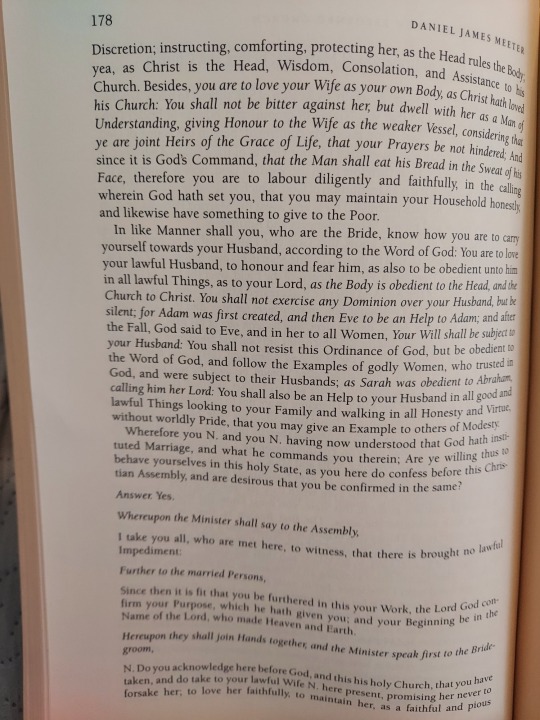
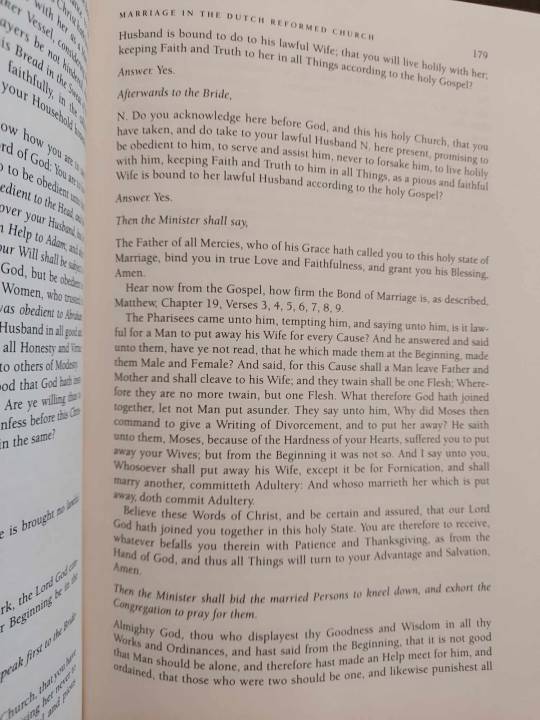
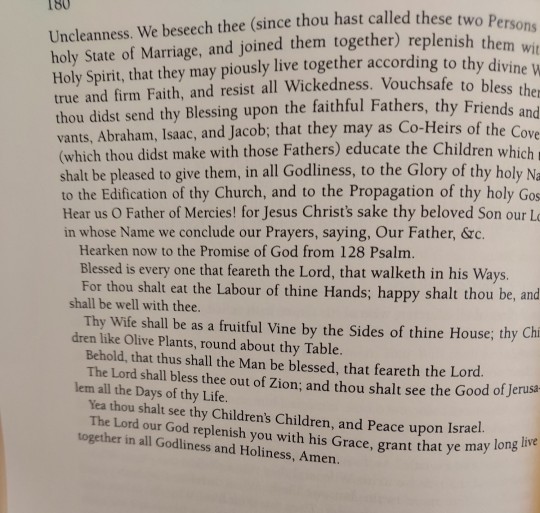
If you’ve made it this far, perhaps you’d also like to read about Dutch epithalamia. Epithalamia were wedding poems/songs - more specifically, for the marital bed/consummation - that were popular all the way from the classical period (they likely arose from the very elaborate wedding rituals of the past ancient Greeks/Balkan peoples) but largely disappeared in the late 19th century and have now been forgotten. There was quite a lot of literature/pamphlets/instruction manuals(?) about how to approach one’s wedding night; epithalamia was the far more naughty/raucous cousin to this literature. But I don’t think anyone really took some of this literature seriously:
...The chapter titled ‘Bruyt’ (Bride) highlights how respectable Protestants wished newly-weds the joys of a chaste Christian marriage and advocated the creation of a devotional atmosphere before becoming one flesh. Cats’s instructions about the wedding day cover various topics, such as the behaviour of the wedding guests, the bride and groom’s mental preparation, orchestrating the mood of the wedding banquet, the symbolic meaning of the bride’s crown, conduct at the nuptial bed, and pious conversation between bride and groom.
* h/t to Dr. Tom Cutterham for this, who is also working on a biography (and working to get a publisher for said biography) on Angelica Schuyler Church “which explores the processes of bourgeois class-formation in this period through the lens of her ideas, exploits, and transatlantic voyages.” He’s already released some of his research/early thoughts on “The Labor of Bourgeois Sexuality” during this period, or listen to the podcast, in which he reads from a section of his biography on ASC’s social climbing to get her husband into Parliament, including a ‘risque’ section of a letter from Baron von Steuben to Church.
#Alexander Hamilton#Elizabeth Schuyler Hamilton#Dutch Reformed Church#18th century marriage#Angelica Schuyler Church
9 notes
·
View notes
Photo

| Because, Evan... {out of my heart, into your head} |
A pining!Eddie playlist that morphed into pining!Buddie ♥
{on spotify}
car crash - mat nathanson ; malibu nights - lany ; everybody but me - nick wilson ; she says - howie day ; lightning strike - a silent film ; weightless - black lab ; is it really me you’re missing - nina nesbitt ; maybe it’s just me - butch walker ; rainy monday - shiny toy guns ; blind - lifehouse ; warning sign - coldplay ; stay - hurts ; lamplight - a silent film ; it had to be you - motion city soundtrack ; blinded (when i see you) - third eye blind ; this tornado loves you - neko case ; just exist - eliza & the delusionals ; chemistry of a car crash - shiny toy guns ; hurt like hell - the heydaze ; why can’t i? - liz phair ; calling you - blue october ; somewhere out there - our lady peace ; never my love - knox hamilton ; beautiful love - the afters ; 4EVER! - lany ; crystallized - young the giant ; be still my heart - the postal service ; crazy for this girl - evan and jaron ; crash and burn - savage garden ; touch - parade of lights ; tonight you’re perfect - new politics ; only you - parson james ; kiss me slowly - parachute ; WiLD - knox hamilton ; you and i both - jason mraz ; over & over - smallpools ; between me and you - brandon flowers ; the one - kodaline ; all this time - onerepublic ; no matter the reason - hanson ; out of my heart - bbmak ; simplify - young the giant ; hello - sugarbomb ; thunder clatter - wild cub ; anywhere but here - safetysuit
#;*#buddie#buddieedit#buddie edit#buddie playlist#911 buddie#911edit#911 fox#evan buckley#eddie diaz#fanmix#buck x eddie
38 notes
·
View notes